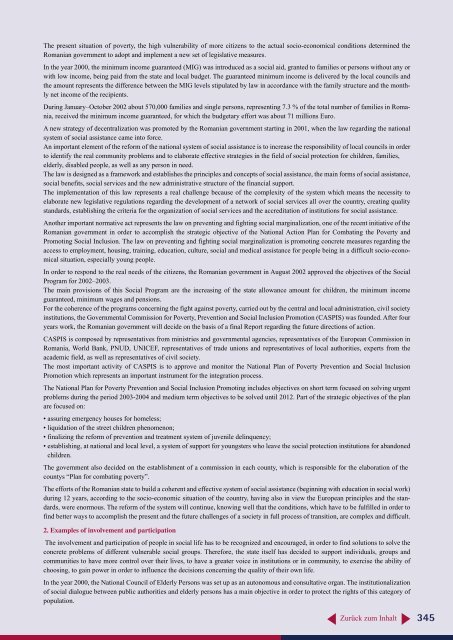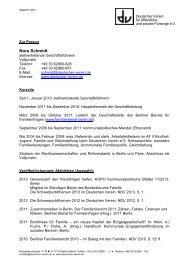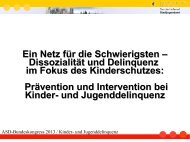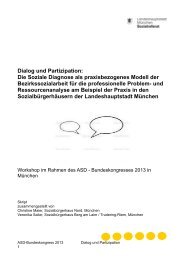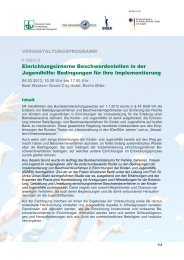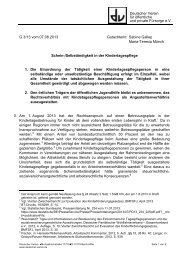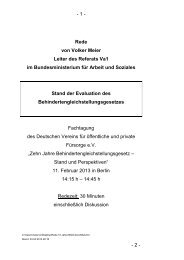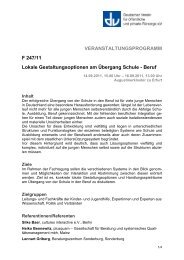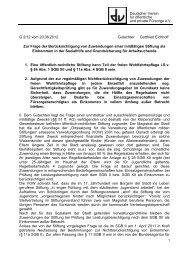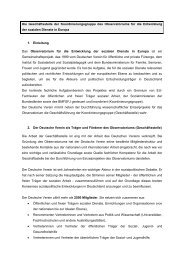Workshop 1.6 - Deutscher Verein für öffentliche und private Fürsorge
Workshop 1.6 - Deutscher Verein für öffentliche und private Fürsorge
Workshop 1.6 - Deutscher Verein für öffentliche und private Fürsorge
Sie wollen auch ein ePaper? Erhöhen Sie die Reichweite Ihrer Titel.
YUMPU macht aus Druck-PDFs automatisch weboptimierte ePaper, die Google liebt.
The present situation of poverty, the high vulnerability of more citizens to the actual socio-economical conditions determined the<br />
Romanian government to adopt and implement a new set of legislative measures.<br />
In the year 2000, the minimum income guaranteed (MIG) was introduced as a social aid, granted to families or persons without any or<br />
with low income, being paid from the state and local budget. The guaranteed minimum income is delivered by the local councils and<br />
the amount represents the difference between the MIG levels stipulated by law in accordance with the family structure and the monthly<br />
net income of the recipients.<br />
During January–October 2002 about 570,000 families and single persons, representing 7.3 % of the total number of families in Romania,<br />
received the minimum income guaranteed, for which the budgetary effort was about 71 millions Euro.<br />
A new strategy of decentralization was promoted by the Romanian government starting in 2001, when the law regarding the national<br />
system of social assistance came into force.<br />
An important element of the reform of the national system of social assistance is to increase the responsibility of local councils in order<br />
to identify the real community problems and to elaborate effective strategies in the field of social protection for children, families,<br />
elderly, disabled people, as well as any person in need.<br />
The law is designed as a framework and establishes the principles and concepts of social assistance, the main forms of social assistance,<br />
social benefits, social services and the new administrative structure of the financial support.<br />
The implementation of this law represents a real challenge because of the complexity of the system which means the necessity to<br />
elaborate new legislative regulations regarding the development of a network of social services all over the country, creating quality<br />
standards, establishing the criteria for the organization of social services and the accreditation of institutions for social assistance.<br />
Another important normative act represents the law on preventing and fighting social marginalization, one of the recent initiative of the<br />
Romanian government in order to accomplish the strategic objective of the National Action Plan for Combating the Poverty and<br />
Promoting Social Inclusion. The law on preventing and fighting social marginalization is promoting concrete measures regarding the<br />
access to employment, housing, training, education, culture, social and medical assistance for people being in a difficult socio-economical<br />
situation, especially young people.<br />
In order to respond to the real needs of the citizens, the Romanian government in August 2002 approved the objectives of the Social<br />
Program for 2002–2003.<br />
The main provisions of this Social Program are the increasing of the state allowance amount for children, the minimum income<br />
guaranteed, minimum wages and pensions.<br />
For the coherence of the programs concerning the fight against poverty, carried out by the central and local administration, civil society<br />
institutions, the Governmental Commission for Poverty, Prevention and Social Inclusion Promotion (CASPIS) was fo<strong>und</strong>ed. After four<br />
years work, the Romanian government will decide on the basis of a final Report regarding the future directions of action.<br />
CASPIS is composed by representatives from ministries and governmental agencies, representatives of the European Commission in<br />
Romania, World Bank, PNUD, UNICEF, representatives of trade unions and representatives of local authorities, experts from the<br />
academic field, as well as representatives of civil society.<br />
The most important activity of CASPIS is to approve and monitor the National Plan of Poverty Prevention and Social Inclusion<br />
Promotion which represents an important instrument for the integration process.<br />
The National Plan for Poverty Prevention and Social Inclusion Promoting includes objectives on short term focused on solving urgent<br />
problems during the period 2003-2004 and medium term objectives to be solved until 2012. Part of the strategic objectives of the plan<br />
are focused on:<br />
• assuring emergency houses for homeless;<br />
• liquidation of the street children phenomenon;<br />
• finalizing the reform of prevention and treatment system of juvenile delinquency;<br />
• establishing, at national and local level, a system of support for youngsters who leave the social protection institutions for abandoned<br />
children.<br />
The government also decided on the establishment of a commission in each county, which is responsible for the elaboration of the<br />
countys “Plan for combating poverty”.<br />
The efforts of the Romanian state to build a coherent and effective system of social assistance (beginning with education in social work)<br />
during 12 years, according to the socio-economic situation of the country, having also in view the European principles and the standards,<br />
were enormous. The reform of the system will continue, knowing well that the conditions, which have to be fulfilled in order to<br />
find better ways to accomplish the present and the future challenges of a society in full process of transition, are complex and difficult.<br />
2. Examples of involvement and participation<br />
The involvement and participation of people in social life has to be recognized and encouraged, in order to find solutions to solve the<br />
concrete problems of different vulnerable social groups. Therefore, the state itself has decided to support individuals, groups and<br />
communities to have more control over their lives, to have a greater voice in institutions or in community, to exercise the ability of<br />
choosing, to gain power in order to influence the decisions concerning the quality of their own life.<br />
In the year 2000, the National Council of Elderly Persons was set up as an autonomous and consultative organ. The institutionalization<br />
of social dialogue between public authorities and elderly persons has a main objective in order to protect the rights of this category of<br />
population.<br />
Zurück zum Inhalt<br />
345


